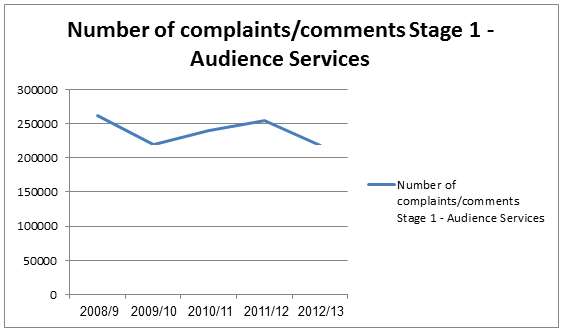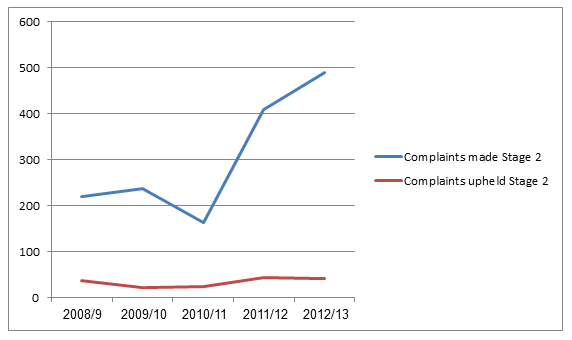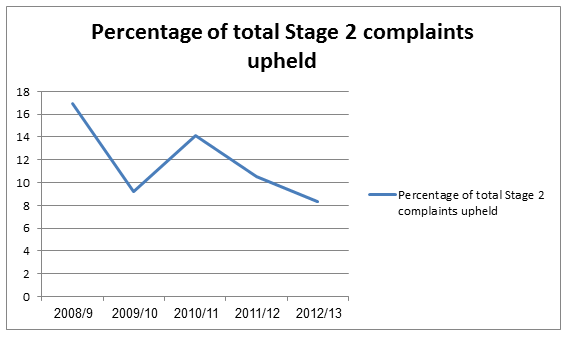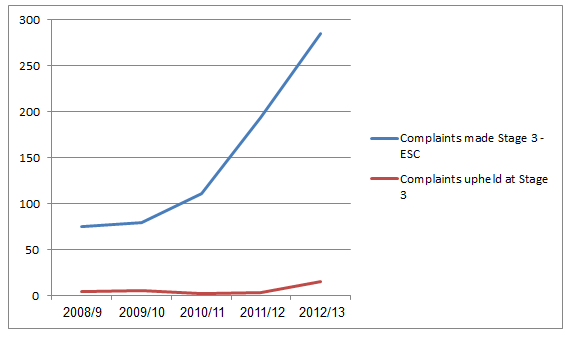In part one of this article we noted the process which led to the BBC’s eventual response to three questions regarding its complaints system which were posed by Mr Neil Turner in April 2013.
• How many complaints were made to the BBC over the last 5 years on a year by year basis?
• How many complaints were upheld (i.e. the BBC makes a correction) on a year by year basis?
• How many complaints were rejected by the BBC (i.e. no corrective action taken)?
So what does the information provided by the BBC tell us about its three-stage complaints system?
Because of the general nature of some of the complaints or comments made at Stage 1, the fact that there is no way of knowing what proportion of them related to editorial issues and the additional fact that no information is kept regarding whether changes are made to BBC content as a result of those complaints or comments, it is impossible to establish how many of the members of the public complaining about editorial content at Stage 1 were satisfied with the response they received (if at all) and how many simply abandoned the process at this stage.
We can, however, clearly conclude that only a small proportion of those complaints were actually pursued further along the process.
At Stage 2 of the complaints process, we see that whilst the actual number of complaints made at that stage has generally risen over the past five years, the percentage of those upheld has fallen.
Seeing as all complaints going on to Stage 3 would have had to pass through Stage 2, we can also look at the number of people whose complaints were not upheld at Stage 2, but dropped out of the process at that point rather than continuing to Stage 3. Hence we see that on average, 45.2% of complainants chose not to pursue further a complaint which was not upheld at Stage 2.
Of those complaints which were pursued to Stage 3, we see that an average of 4.28% were upheld in full.
The fact that a complaint is upheld at Stage 3 indicates that the process at Stage 2 was inadequate, and thus we can see how many complaints which were rejected at Stage 2 were later found to be justified at Stage 3.
The information provided does not include complaints which were partially upheld at Stage 3 and thus likewise indicate that the process at Stage 2 was at least inadequate in part. It is of course impossible to know how many of the 45.2% of complaints which dropped out of the system after rejection at Stage 2 would have been upheld at Stage 3 had they reached that part of the procedure.
As we have documented here in the past (see for example here and here), even the fact that a complaint – which may have spent months or even years going through the entire long and complicated BBC complaints procedure – is upheld at Stage 3 does not guarantee that a correction will be made to the relevant report or that the public will be informed of any amendment made. Clearly there is an urgent need for reform of that part of the procedure.
As a publicly funded body, the BBC should welcome the feedback from its licence-fee payers which comes in the form of comments or complaints. That feedback is a valuable tool for the improvement of the standard of its journalism and a way for the BBC to feel the pulse of the people for whom – after all – it exists. Instead, members of the public find themselves facing a complicated, time-consuming and – importantly – self-regulating and therefore subjective process which, as these figures provided by the BBC show, simply causes most people to abandon the process and drop out along the way.










